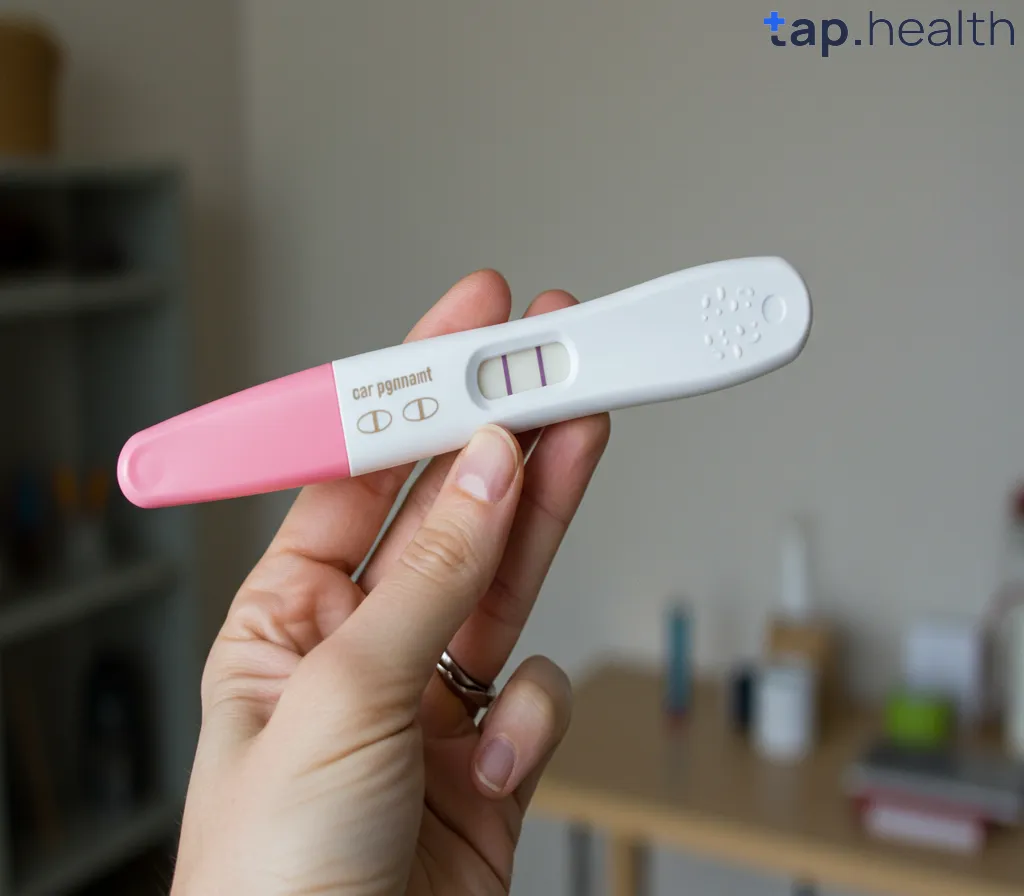Pregnancy tests are one of the easiest ways to find out if you’re expecting, but many people have questions about when the best time is to take the test. One common question that arises is, “Can you take a pregnancy test in the afternoon?” The short answer is yes, but there are some important things to consider for the most accurate results.
In this post, we’ll go over everything you need to know about taking a pregnancy test, the best time to test, whether afternoon testing works, and how to ensure that your results are reliable. Let’s break down the facts so you can get the answers you’re looking for.
Understanding How Pregnancy Tests Work
Before diving into the timing of pregnancy tests, it’s important to understand how they actually work. Home pregnancy tests detect human chorionic gonadotropin (hCG), a hormone that your body produces during pregnancy. After conception, the fertilized egg implants into the uterus, triggering your body to release this hormone into your bloodstream and urine.
Pregnancy tests typically detect hCG in your urine, and the higher the concentration of this hormone, the more likely you are to get a positive result. For the test to work effectively, your urine needs to contain enough hCG to trigger a positive result.
The Basics of Pregnancy Test Sensitivity
Home pregnancy tests have varying levels of sensitivity, usually measured in milli-international units per milliliter (mIU/mL). Most tests are designed to detect hCG levels as low as 25 mIU/mL, which is typically enough to indicate pregnancy. However, some tests are more sensitive and can detect as little as 10 mIU/mL.
Because hCG levels rise steadily in early pregnancy, a test that is highly sensitive may provide a positive result sooner. Conversely, lower-sensitivity tests may only show accurate results after hCG levels have increased significantly.
Can You Take a Pregnancy Test in the Afternoon?
Yes, you can take a pregnancy test in the afternoon, but for the most reliable result, it’s often better to test with first-morning urine. Here’s why:
Why Is First Morning Urine Ideal for Testing?
The reason first-morning urine is recommended for pregnancy testing is that it is typically the most concentrated. After a full night’s sleep, your body has had time to accumulate urine in the bladder. This means it has a higher concentration of hCG and will provide a more accurate result, especially if you’re testing early in your cycle.
The main factors that make first-morning urine preferable include:
- Higher hCG levels: After a long period without urination, your urine is concentrated, so hCG levels are higher, which increases the chances of detecting pregnancy.
- Fewer Dilutants: Overnight, you’ve had less time to drink water or other liquids, which means your urine is less diluted compared to testing later in the day.
How Afternoon Urine Affects Pregnancy Tests
In the afternoon, your urine is generally less concentrated. If you drink liquids throughout the day, your urine will be more diluted, which means there might be less hCG present, even if you are pregnant. This can result in a false negative, especially if you’re testing very early in pregnancy.
Can You Get an Accurate Result in the Afternoon?
If you take a pregnancy test in the afternoon, the result may still be accurate, but it’s less reliable compared to testing in the morning. If you’re testing at a time other than first-morning urine, consider waiting a few more days and testing again with morning urine for the most accurate result.
Why a Negative Test in the Afternoon Might Be Wrong
If you’re testing in the afternoon and getting a negative result, it doesn’t necessarily mean you are not pregnant. It could be due to:
- Diluted urine: As mentioned, drinking fluids throughout the day can dilute your urine, lowering the concentration of hCG.
- Testing too early: If you test too early, even first-morning urine might not show a positive result. Waiting a few more days can help your hCG levels rise to a detectable level.
- Test sensitivity: Not all pregnancy tests are equally sensitive. If you’re using a less sensitive test, it may not detect lower hCG levels, particularly if you test later in the day.
When Is the Best Time to Take a Pregnancy Test?
While you can take a pregnancy test at any time of day, there are optimal times for the most reliable results:
1. First Morning Urine
The best time to take a pregnancy test is first thing in the morning. Your urine is most concentrated, and hCG levels are more likely to be detectable, especially if you’re testing early in your pregnancy. If you want to be certain of the result, testing in the morning is the safest bet.
2. After a Missed Period
For the most accurate results, you should wait until after your missed period to take a test. At this point, hCG levels should be high enough for most tests to detect pregnancy, even if you test later in the day.
3. Waiting a Few Days After a Negative Result
If you take a test and get a negative result, but still suspect pregnancy, wait two to three days and test again. This is especially true if you’re testing before your missed period. As your pregnancy progresses, hCG levels increase, making it easier for the test to pick up the hormone.
Can You Get a False Negative in the Afternoon?
Yes, it’s possible to get a false negative result if you test in the afternoon. Here’s why:
1. Diluted Urine
Drinking fluids throughout the day dilutes your urine, which can reduce the concentration of hCG in your urine. Even if you are pregnant, the diluted urine may not have enough hCG to trigger a positive result.
2. Testing Too Early
Testing before your hCG levels are high enough can result in a false negative, regardless of whether you test in the morning or afternoon. If you’re testing too early, your hCG levels may not be detectable yet, so it’s important to wait at least until your missed period.
3. Test Sensitivity
Some pregnancy tests are more sensitive than others. A test with a lower sensitivity (e.g., detecting 25 mIU/mL of hCG) may not give a reliable result in the afternoon if your urine is diluted. Tests with higher sensitivity may detect pregnancy even in diluted urine, but they are still more accurate when testing with first-morning urine.
Tips for Getting Accurate Pregnancy Test Results
To ensure you get the most accurate results from your pregnancy test, follow these tips:
1. Use the First-Morning Urine
Test first thing in the morning for the most accurate result. Your urine will be most concentrated, and hCG levels are more likely to be detectable.
2. Wait Until After Your Missed Period
To increase the chances of a positive result, wait until after you’ve missed your period. This ensures that your hCG levels are higher and more detectable by the test.
3. Follow the Instructions Carefully
Make sure you read and follow the instructions for the specific pregnancy test you are using. Each test may have slight differences in how you should use it and how long you should wait before reading the result.
4. Check the Expiration Date
Always check the expiration date of the pregnancy test. Using an expired test can lead to inaccurate results.
5. Test Again in a Few Days
If you get a negative result but still suspect pregnancy, wait a few days and test again, preferably with first-morning urine. Your hCG levels may have risen by then.
FAQ on Can You Take a Pregnancy Test in the Afternoon?
Can I take a pregnancy test in the afternoon?
Yes, you can take a pregnancy test in the afternoon, but it is generally less reliable than testing with first-morning urine. Afternoon urine is more diluted, which can reduce the accuracy of the test, especially if you’re testing early in your pregnancy.
Why is morning urine better for pregnancy tests?
Morning urine is more concentrated, which means it has a higher concentration of hCG. This increases the chances of getting an accurate result, especially when testing early in pregnancy.
Can you get a false negative in the afternoon?
Yes, it’s possible to get a false negative if you test in the afternoon because your urine may be diluted. Diluted urine has lower hCG levels, which can make it harder for the test to detect pregnancy.
How early can I take a pregnancy test?
You can take a pregnancy test as early as 6-8 days before your missed period, but testing too early might result in a false negative. For the most accurate result, wait until after your missed period.
Can I take a pregnancy test twice a day?
It’s not necessary to take a pregnancy test twice a day. If you want to retest, it’s best to do so after a couple of days, using first-morning urine for the most accurate result.
In conclusion, while you can technically take a pregnancy test in the afternoon, it’s always best to test with first-morning urine for the most accurate results. If you’re testing early in your cycle or suspect pregnancy, consider waiting until after your missed period and testing again with concentrated urine to get the most reliable outcome. Remember to follow the instructions carefully, check the expiration date, and consult your healthcare provider if you have any doubts about the results.



